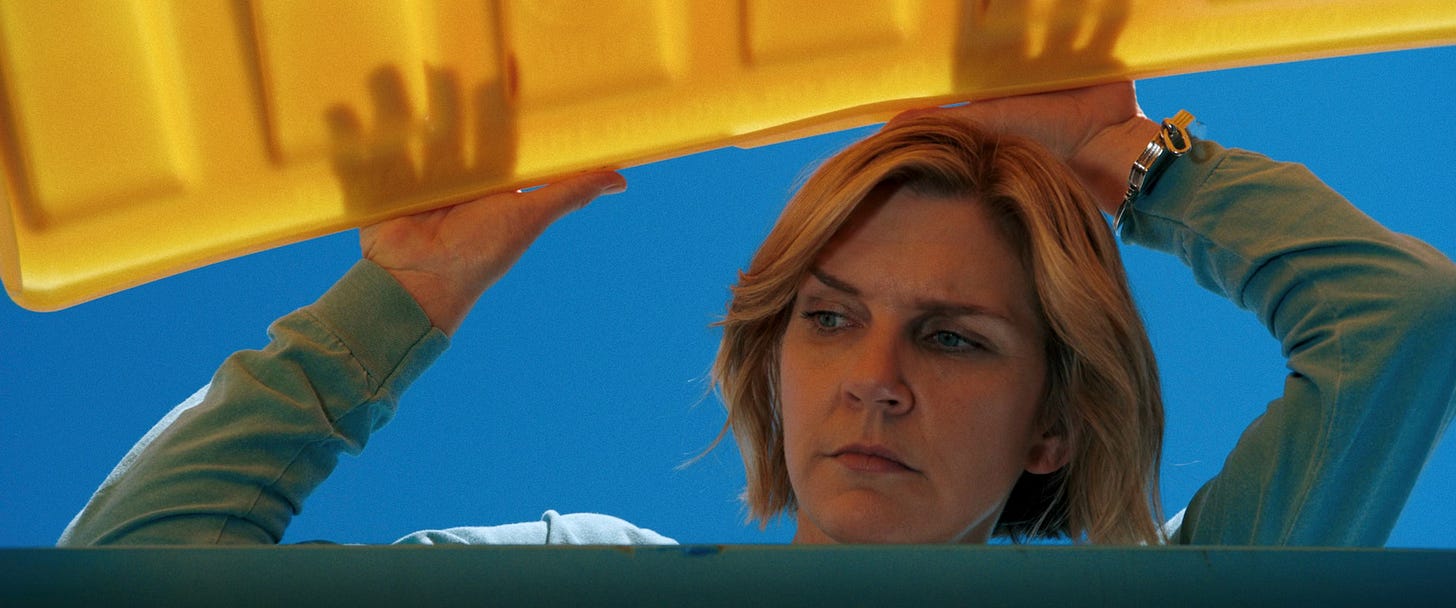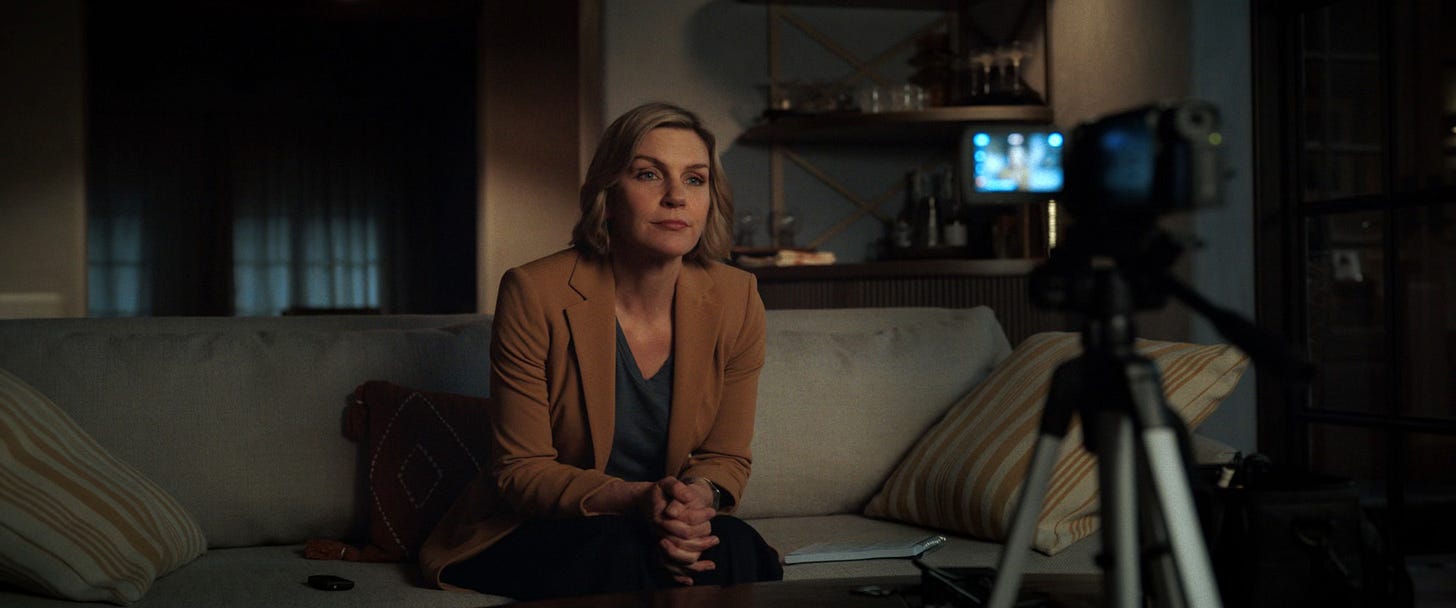Pluribus S1E05 Review | “Got Milk”
The necessity of grief and understanding supply chains.
[This review contains spoilers for Pluribus Season 1, Episode 5, “Got Milk”]
As we’ve passed the halfway point of Pluribus’ first season, folks have wondered what the show is “about.” Why did creator Vince Gilligan want to make a show about almost all of humanity transforming into a pleasantly banal hive mind, and the one woman who can’t stand what the world has become? Is it about generative A.I.? Is it about influencers? While there’s plenty of social and cultural subtext to mine here, “Got Milk” also shows that Pluribus is a grief drama. In the swarm of a world-shifting event, Gilligan hasn’t lost sight of the fact that his protagonist has suffered a severe personal loss, and that doesn’t go away because there’s a larger mystery at play. The show’s fifth episode blends the larger plot and personal turmoil perfectly as Carol works to uncover what feeds the hive, but also gives Helen a real burial.
The episode kicks off with the hive finally having had enough of Carol’s attitude. Her attempt to get the truth out of Zosia and triggering a worldwide crying fit and pleas of “Please, Carol,” have caused the hive to vacate Albuquerque like the people of Terror Lake when The Thompsons show up. They leave Carol a recorded message saying that they’ll still provide for her, but do so at a distance as they need their space. It’s also incredibly funny that a global superintelligence cannot stand to live with Carol Sturka and has now left her an entire city to herself. And yet underneath the comedy is the reality of not only her isolation, but the limitations of the hive’s emotional range. Yes, there’s a survival imperative at work, but the hive cannot brook anything beyond being nice. But individuals are not always nice. Sometimes we’re suffering, and our worst selves emerge because we’re in emotional pain. Erasing that erases what makes us human.
With Carol left as the sole resident of Albuquerque, she works to live her daily life with minimal assistance from the hive. This leads to one of the best comic bits in the series as, once wolves start rooting through her trash, she must find a way to dispose of it. The hive’s solution is to send in a drone that can carry the trash away. In practice, that looks like a dumb little robot flying in, trying to haul away a single trash bag that’s still too heavy for it, and then getting wrapped around a lamp post. Truly, the future is here.
Aside from being one of the funniest things the show has done thus far, it also emphasizes the social points Gilligan appears to be making about our increasingly tech-reliant society. Just as the hive behaves with the pleasant, nondescript demeanor of ChatGPT and seeks to provide all comforts as the tech industry professes to do, we also see the limitations of such behavior, and that such “optimization” is never as far ahead as it proclaims. Consider Elon Musk’s promise of robots that follow people around all the time so that no one commits crimes. Aside from being creepy and invasive, it’s also impractical because robotics are not as advanced as technologists would like to pretend. We’re going to need people, not machines.
The story weaves this struggle of garbage removal with Carol’s ongoing grief. The running clock reminds us that only eight days have passed since the hive’s takeover, but the clock also marks time since Helen’s death. It’s only been a little over a week since Carol lost the woman she loves, and grappling with a worldwide hive takeover hasn’t left much time for grief. “Got Milk” lets those emotions finally emerge as Carol looks at the empty bed she shared with Helen, and what hurts isn’t losing an entire town; it’s losing the person you love. The handcuff still around Carol’s wrist isn’t only a symbol of reliance on others, but Carol’s connection to a life that no longer exists.
These emotions come to a turning point in a potent bit of symbolism as the wolves, denied their garbage, now come to dig up Helen’s body. Carol tries to grab the shotgun from the cop car, but can’t figure out how to unlock it. She decides to use the car itself as both a weapon and a way to shield the grave from further desecration. Helen was “buried,” but not properly mourned or marked. It was an improvised solution rather than addressing the necessity of grief. In the cold light of the following morning, real answers arrive. The shotgun unlocks by pressing a button. The handcuffs unlock because their key is on the same ring as the one that holds the key to the vehicle. The grave needs paving stones. Grief isn’t just an emotional outburst; it’s how we also manage to compose ourselves and find simple solutions that previously felt impossible.
Throughout this grieving process, we have Carol working to solve the larger mystery of how to defeat the hive. She’s firmly in her YouTuber era (“Greetings, fellow survivors!”), making videos to send to the other unaffected people on Earth, and her vlogging is another way that Gilligan and his writers are cleverly nodding to our current lives of alienation and atomization. We’re speaking to people rather than having an immediate conversation of give-and-take. Carol shares what she’s learned about the hive, including that they really love milk…except it’s not milk. Carol’s investigation leads her to discover that whatever the hive is imbibing, it doesn’t come from cows. It has a pH level roughly equal to water, but it’s not water. It’s some kind of viscous fluid like olive oil, and it derives from a mysterious crystalline compound. Carol’s investigation finally leads her to a factory in Albuquerque and the discovery she makes there…well, it’s going to be quite the wait until next week’s episode.
“Got Milk” is the kind of episode that shows why Gilligan is a master of his craft. We’ve seen before how good he is at playing against expectations, but more than that, he puts characters and emotions first within the larger drama. We want to know more about the hive, their machinations, and if Carol can “win,” but that plotting will only get you so much emotional investment. You need to be on a journey with the character and what they’re suffering through. Pluribus is absolutely a show about modern life and the way we’ve grown increasingly disconnected from each other in the name of efficiency and optimization. But it’s also a show about a person whose loneliness comes not only from being unaffected by a hive-mind takeover; it’s about the loneliness that’s innate to being human and the necessity of grief.
Stray observations:
“Why do you do such things? Are you mentally unsound?” I don’t think Laxmi (Menik Gooneratne) is necessarily right in her beliefs, but I do love how openly hostile she is towards Carol.
I love the irony that a show that seems so firmly anti-tech landed on Apple TV.
I like how the episode plays a bit with Carol’s drinking. It’s been strongly implied that Carol used to have a serious substance abuse problem, and that she’s still a heavy drinker. But in “Got Milk,” she starts by hiding her bottles, then pouring a drink but not imbibing because she’s distracted by the wolves, and then finally taking a drink after putting down all the paving stones. It’s as if she finally gets to finish the drink she and Helen were going to share in the first episode before the hive took over.
That is some primo barcode identification by Carol. How did she recognize it from just the packaging!
Pluribus airs on Fridays on Apple TV. Matt Goldberg is a critic who lives and works in Atlanta. If you enjoyed this review, check out his newsletter, Commentary Track.



Great commentary. I too am puzzled by what clues she used to find that factory looking through the aisles and examining the barcode in one